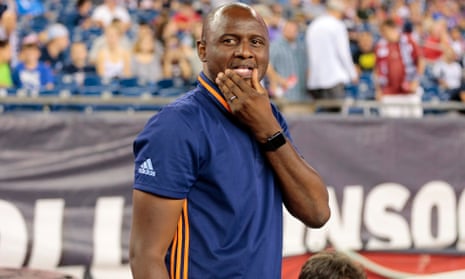The tributes started long before Patrick Vieira had officially departed as head coach of New York City FC.
In the wake of Saturday’s 1-1 draw against Atlanta United, David Villa, a man whose endorsement carries weight, talked about the “identity” that Vieira had cultivated during his two-and-a-half-years at the club, before discussing the need to maintain that course. Talk of Vieira’s impact continued late on Sunday night when news broke accidentally via Manchester City’s website that he had chosen to continue his career back in Europe with OGC Nice, following weeks of speculation.
The begrudging acceptance from NYC FC supporters shows just how well Vieira has done during his spell in the Bronx. There was a large dose of skepticism when NYC FC – who had just finished their debut season by missing the playoffs – appointed Vieira as their head coach in November 2015. Traditionally, European coaches have not flourished in MLS, especially those who arrive without experience of the league and its unique mechanisms. Terms such as allocation money and the SuperDraft are befuddling to those coaches not used to a salary cap.
When addressing such concerns in January 2016, Vieira displayed his usual blend of calm assertiveness. “This is the reason why I need to have [director of football operations] Claudio [Reyna] next to me to get me more into details of the rules in this country,” Vieira said.
He also pushed back against his doubters by building a clear tactical identity for the team. Initially, the World Cup winner wanted his players to be comfortable on the ball, to play through teams, and ultimately to entertain. That style drove NYC FC to second in the Eastern Conference in both of Vieira’s first two seasons, but that success was cast alongside disappointing playoff defeats to Toronto FC, in 2016, and to the Columbus Crew SC, in 2017.
Vieira accepted the need for further change and began to impose his will. During his second season, he phased Andrea Pirlo out of the starting XI as he sought a younger, more dynamic, team. He continued towards that goal this season and worked with City Football Group’s global scouting network to recruit a string of players under the age of 25.
Just as the starting line-up began to change so too did the team’s tactics. This season NYC FC have pressed opponents high up the field, and while they still prefer to play possession football, they are now also able to be direct and transition the ball quickly from defence to attack. That evolution is why they once again sit second in the Eastern Conference, a long way from where Vieira inherited them.
The Frenchman’s reign had its faults though. Vieira could be tactically stubborn. This presented itself most notably against the New York Red Bulls, whose style is reminiscent of Jürgen Klopp’s Liverpool side, and troubled NYC FC and Vieira consistently. Vieira won three and drew one of the nine matches he contested against NYC FC’s cross-city rivals. While on the surface that appears an acceptable record, he lost his first meeting 7-0 at Yankee Stadium, and suffered a 4-1 defeat later that same season. He followed that up with three more defeats, two of which were by a scoreline of 4-0, including the most recent fixture last week.
It would, however, be unfair to claim a poor derby record as the legacy of Vieira’s New York tenure. He inherited a team that had endured a poor first season in MLS. Not only had they finished down the league, but Frank Lampard’s decision to skip the first few months of the season to stay with Manchester City drained the enthusiasm of supporters. From there Vieira built the club an ethos, improved individuals, and ushered in the first handful of academy players. Vieira dispelled the notion that European coaches cannot thrive in MLS, and now he must go against convention again.
MLS boasts a handful of promising young coaches, mostly American, and although Jesse Marsch has been linked with a move to RB Leipzig this summer, Vieira is the first of this new generation with an MLS foundation to coach in a top European league. And if he can bring that same blend of leadership and identity to the French Riviera it may change the way people view MLS.
Nice represent a tough proposition, however. The club finished third in Ligue 1 in 2016-17 and qualified for the Champions League. Their form dipped last season as they finished eighth, with both leading scorer Mario Balotelli and midfielder Jean Michaël Seri expected to leave this summer. That gives Vieira the chance to build something new and exciting, as his mentor Arsène Wenger did when he arrived from a less-heralded competition, the J-League, to take over Arsenal in 1996.
Comparisons between the two may seem a stretch, but what is certain, is that Vieira leaves New York having changed both his reputation and that of the league he left behind.

Comments (…)
Sign in or create your Guardian account to join the discussion